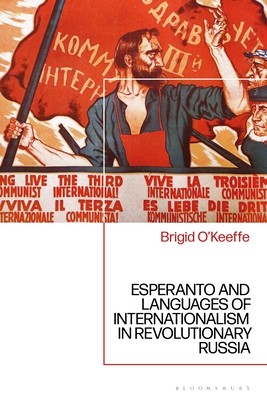
- We will send in 10–14 business days.
- Author: Brigid O'Keeffe
- Publisher: Bloomsbury Publishing PLC
- Year: 2021
- Pages: 266
- ISBN-10: 1350160652
- ISBN-13: 9781350160651
- Format: 15.6 x 23.4 x 1.6 cm, hardcover
- Language: English
- SAVE -10% with code: EXTRA
Esperanto and Languages of Internationalism in Revolutionary Russia (e-book) (used book) | bookbook.eu
Reviews
Description
Hoping to unite all of humankind and revolutionize the world, Ludwik Zamenhof launched a new international language called Esperanto from late imperial Russia in 1887. Ordinary men and women in Russia and all over the world soon transformed Esperanto into a global movement. Esperanto and Languages of Internationalism in Revolutionary Russia traces the history and legacy of this effort: from Esperanto's roots in the social turmoil of the pre-revolutionary Pale of Settlement; to its links to socialist internationalism and Comintern bids for world revolution; and, finally, to the demise of the Soviet Esperanto movement in the increasingly xenophobic Stalinist 1930s. In doing so, this book reveals how Esperanto - and global language politics more broadly - shaped revolutionary and early Soviet Russia.
Based on extensive archival materials, Brigid O'Keeffe's book provides the first in-depth exploration of Esperanto at grassroots level and sheds new light on a hitherto overlooked area of Russian history. As such, Esperanto and Languages of Internationalism in Revolutionary Russiawill be of immense value to both historians of modern Russia and scholars of internationalism, transnational networks, and sociolinguistics.
EXTRA 10 % discount with code: EXTRA
The promotion ends in 17d.16:31:15
The discount code is valid when purchasing from 10 €. Discounts do not stack.
- Author: Brigid O'Keeffe
- Publisher: Bloomsbury Publishing PLC
- Year: 2021
- Pages: 266
- ISBN-10: 1350160652
- ISBN-13: 9781350160651
- Format: 15.6 x 23.4 x 1.6 cm, hardcover
- Language: English English
Hoping to unite all of humankind and revolutionize the world, Ludwik Zamenhof launched a new international language called Esperanto from late imperial Russia in 1887. Ordinary men and women in Russia and all over the world soon transformed Esperanto into a global movement. Esperanto and Languages of Internationalism in Revolutionary Russia traces the history and legacy of this effort: from Esperanto's roots in the social turmoil of the pre-revolutionary Pale of Settlement; to its links to socialist internationalism and Comintern bids for world revolution; and, finally, to the demise of the Soviet Esperanto movement in the increasingly xenophobic Stalinist 1930s. In doing so, this book reveals how Esperanto - and global language politics more broadly - shaped revolutionary and early Soviet Russia.
Based on extensive archival materials, Brigid O'Keeffe's book provides the first in-depth exploration of Esperanto at grassroots level and sheds new light on a hitherto overlooked area of Russian history. As such, Esperanto and Languages of Internationalism in Revolutionary Russiawill be of immense value to both historians of modern Russia and scholars of internationalism, transnational networks, and sociolinguistics.


Reviews